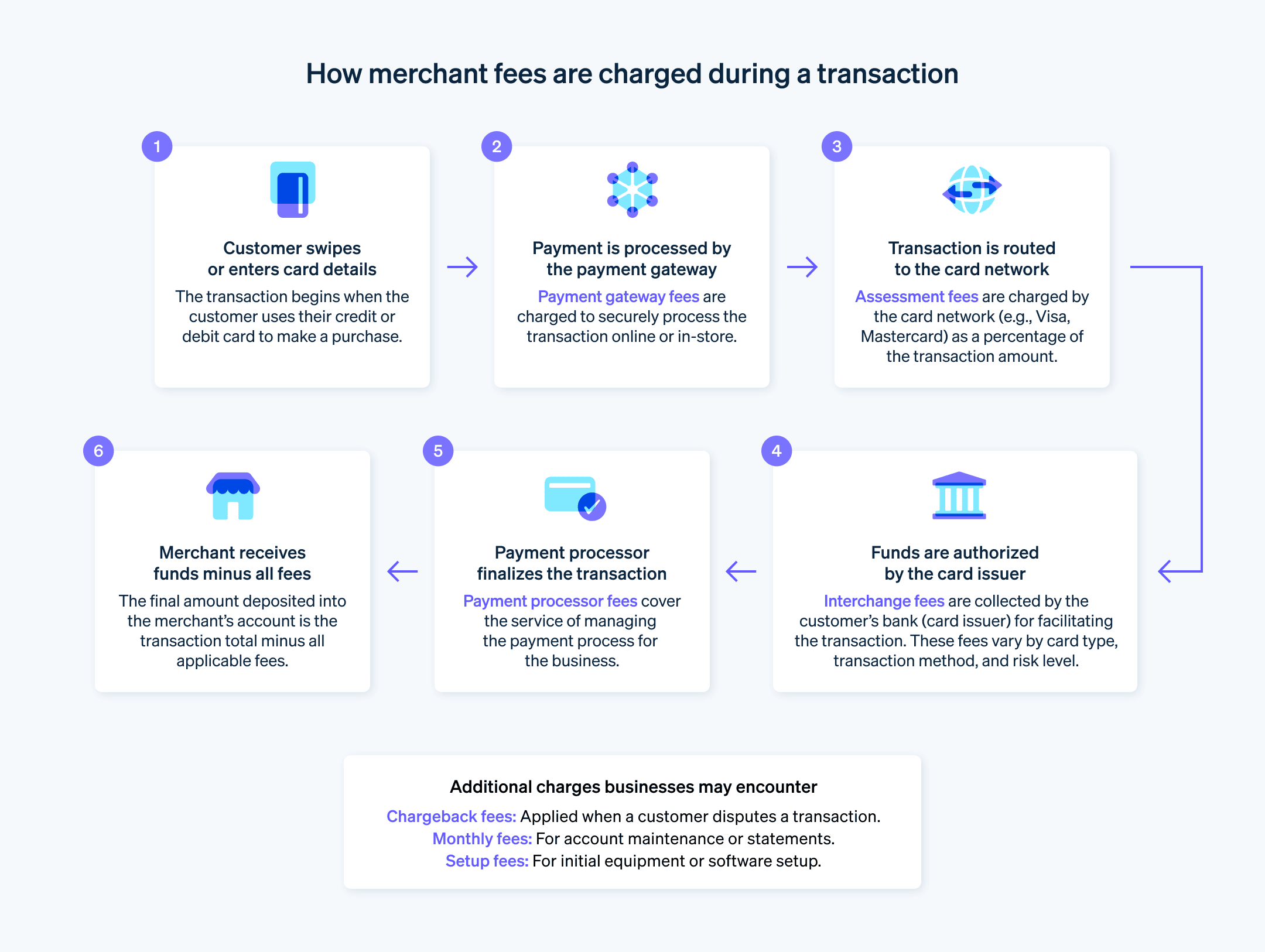商家费用是企业在接受电子支付方式(例如信用卡或借记卡)时必须支付的费用。这些费用是几种不同成本的组合,通常是交易金额的百分比,有时还需要额外的固定费用。虽然商家费用只占总交易价格的一小部分,但加在一起也是一笔不小的数目。根据尼尔森报告,2022 年美国企业为处理近 10.6 万亿美元的支付,总共支付了 1607 亿美元的费用。
下面,我们将介绍商家费用的关键要素,包括大多数企业会遇到的费用类型、减少商家费用对利润的整体财务影响的方法,以及选择支付处理提供商时要考虑的因素。
目录
- 商家费用的类型
- 为什么商家费用对企业来说如此重要
- 最小化商家费用和成本的方法
- 如何选择支付处理提供商
- Stripe 的商家费用
商家费用类型
商家费用包括商家在处理电子支付(例如信用卡或借记卡交易)时面临的各种费用。商家费用的主要类型包括:
交换费:这是客户信用卡或借记卡的银行发卡机构收取的费用。该金额是交易价值的百分比,可能包括固定费用。交换 费率取决于所使用的卡类型、交易的风险等级以及交易是当面交易还是线上 交易。
评估费用:此类费用由信用卡组织(例如 Visa、万事达卡、美国运通卡 等)收取,通常是交易金额的固定百分比。商家的银行向卡组织支付评估费用。
支付处理商费用:此类费用由代表企业处理交易的支付处理商 公司收取。它们的结构方式多种多样,包括每笔交易的百分比、每笔交易的固定费用、月费或这些费用的组合。
月结单费用:一些支付处理商会收取提供月度交易对账单的费用。
支付网关费用:企业经常使用支付网关,并且此服务可能会收取自己的一套费用。这可以是每笔交易费用、月费或两者兼而有之。
最低月费:一些处理商收取最低月费,这是企业每月必须支付的最低处理费。如果交易费用加起来没有达到这个金额,则企业支付差额。
拒付费用:当客户对交易提出异议时,可能会导致企业需要退还资金,这被称为拒付。当发生拒付时,通常会向企业收取费用。该费用包括与处理争议相关的行政费用。
提前终止费:一些商家服务协议有合同期限,提前终止合同可能会产生费用。
杂费:这些费用可能包括附加服务的费用,例如纸质对账单、批处理费或不遵守安全 标准的费用。
为什么商家费用对企业来说如此重要
商家费用直接影响企业的盈利能力。如果管理不当,每次刷信用卡或借记卡都会消耗企业的底线。
了解商家费用如此重要的原因如下:
它们会影响定价:商家费用是一种业务费用,就像租金或员工 工资。为了支付这些成本,企业需要将其吸收到利润率中,或者以更高的价格将其转嫁给客户。了解您的商家费用有助于您做出明智的定价策略决策,并避免在交易中蒙受损失。
它们可能会有很大差异:不同类型的卡、交易金额和行业有不同的交换费。例如,借记卡的交换费通常低于信用卡,线上交易 的费用通常高于店内购物。通过了解这些变化,您可以选择对您的业务最具成本效益的支付方式和处理选项。
它们可以协商:虽然某些费用(如交换费)由卡组织设定,但其他费用(如商家账户费用)可以与您的支付处理商协商。了解不同类型的费用及其计算方式,可以让您有能力协商更优惠的价格。
它们可以帮助您识别欺诈行为:当客户对交易提出异议时,会产生一些商家费用,例如拒付费用。了解与拒付相关的费用可以让您为应对潜在的欺诈 做好准备,防止其侵蚀您的底线。

最小化商家费用和成本的方法
虽然商家费用是现代企业处理支付不可避免的一部分,但正确的策略可以降低成本,减少麻烦。以下是一些关键方法:
选择合适的支付处理商:选择合适的支付处理商意味着根据您企业的交易模式评估其费用结构。对于不同的交易规模和交易量,处理商有不同的条款,有些可能会为您的行业提供特定的好处。
协商更低的费率:交易量大或有销售历史的企业有可能与支付处理商协商降低费率。
鼓励借记卡付款:借记卡交易的费用通常低于信用卡。鼓励客户使用借记卡,可能通过激励措施或折扣,有助于降低整体交易成本。
设置最低银行卡交易金额:对银行卡支付实施最低购买要求有助于抵消交易费用,使小额交易更具成本效益并保护利润率。
批量处理交易:一次性处理所有银行卡交易(通常在一天结束时)可能比在每笔交易发生时处理更具成本效益。
选择标准化的硬件和软件:对于企业来说,使用广泛支持的标准支付处理解决方案可能更经济。使用这些类型的解决方案还可以使企业更容易获得支持和维护。
避免拒付:企业可以通过明确的政策、卓越的客户服务和全面的欺诈预防 措施减少拒付。拒付会带来额外费用,并可能增加企业的处理成本。
定期查看商家账户对账单:查看账户对账单可以帮助您识别和解决意外费用、账单错误或费用结构的变化。
确保 PCI 合规性:遵守支付卡行业数据安全标准 (PCI DSS) 可帮助您避免不合规费用,并防止代价高昂的数据泄露和相关罚款。
使用非高峰处理时间:一些支付处理商对非高峰时段处理的交易收取较低的费用,这对于批处理来说可能是一个节省成本的机会。
利用技术提高效率:现代销售点 (POS) 系统和支付技术可以加快交易处理速度,减少错误,并提供有价值的销售和客户洞察力。
考虑其他支付方式:提供替代支付方式,例如银行转账 或数字钱包 可以吸引更广泛的客户群,并且与传统信用卡交易相比,处理费用可能更低。
如何选择支付处理提供商
对于任何接受线上或当面付款的企业来说,选择合适的支付处理提供商都是重要的一步。它可以影响从客户体验到您的底线的方方面面。以下是选择过程的运作方式:
了解您的需求
交易量:您预计每月处理多少笔交易?更高的交易量可能需要专门的客户经理或不同的定价模式。
业务类型:您的业务是纯线上、实体还是混合?每个类别可能需要特定的功能。
支付方式:您的客户更喜欢哪种支付方式?信用卡、借记卡、数字钱包、ACH 转账?优先考虑支持您需求的提供商。
集成:您现有的软件/POS 系统是否与提供商兼容?顺畅的集成可节省时间和资源。
撤单率:某些行业具有更高的拒付风险。考虑提供商的拒付预防工具和与争议相关的费用。
全球扩张:如果您计划进行国际扩张,请确保提供商支持所需的货币并遵守地区法规。
经常性计费:如果您提供订阅,请选择具有定期计费 功能和报告功能的提供商。
研究潜在提供商
热门选项:研究行业领导者以充分了解您的选择。
较小的玩家:较小的提供商可能会提供利基功能或迎合特定行业。
评论和功能:查看独立评论网站并比较入围提供商提供的功能。
用户体验:寻找用户评论和测试演示,以评估提供商的平台可用性和界面。
安全认证:查找行业认可的认证,例如 PCI DSS Level 1,以实现安全数据处理。
集成和插件:检查与现有软件的兼容性以及任何必要的插件以增加功能。
考虑这些关键因素
费用和定价:比较交易费用、月费、PCI 合规成本以及任何潜在的隐藏费用。寻找透明度和灵活的定价模式。
安全性:评估提供商的安全措施,例如 PCI 合规性、欺诈预防工具和数据加密 协议。
客户支持:检查客户支持渠道的可用性、质量和响应时间。
可扩展性:提供商能否适应您未来的增长需求?考虑交易限额、账户管理选项和国际功能。
缩小您的选择范围并比较报价
缩小范围:选择两到三个最能满足您需求的提供商。
获取报价:索取详细报价,详细说明所有费用和潜在收费。
细致认真:澄清您对他们的服务的任何疑问或问题。
议价:准备好协商费用,尤其是对于大批量或长期承诺。
测试支持:如有问题,请联系客户支持,以评估他们的知识和响应能力。
免费试用和演示:使用可用的试用期或演示来测试平台的功能以及与您的工作流程的兼容性。
做出决定
权衡您的优先事项:优先考虑您最重要的需求(例如安全性、功能或成本),以便做出最终决策。
仔细阅读合同:密切关注终止条款、隐藏费用和争议解决程序。
做出选择:选择具有最佳功能、安全性、价格和客户支持组合的提供商。
Stripe 的商家费用
Stripe 采用随用随付模式,没有设置费或月费。这意味着企业只需为他们处理的交易付费。Stripe 的费用根据地点和支付方式(例如信用卡、借记卡、银行转账、先买后付)等因素,按不同的设定费率对每笔交易收取。以下是 Stripe 的主要费用 的明细。
其他费用
撤单:Stripe 通常对每个争议收取统一费率,具体费率因地点而异。
货币兑换:Stripe 对货币兑换收取费用,费率取决于位置。
Radar 欺诈预防:Stripe 的欺诈检测工具 内置于系统中,采用标准定价的账户免收相关费用。但是,某些企业计划可能需要更高级的安全性并收取额外费用。
PCI 合规性:企业有责任维护 PCI 合规性,这可能会涉及额外费用。
以下是一些可能影响您的 Stripe 费用的因素
您的业务类型:某些行业的交换费较高(由卡组织收取),Stripe 会转嫁给您。
您的交易量:销量大的企业可能有资格享受商定的费率。
客户使用的银行卡类型:高级卡的交换费可能更高。
详细了解 Stripe 的定价结构。
本文中的内容仅供一般信息和教育目的,不应被解释为法律或税务建议。Stripe 不保证或担保文章中信息的准确性、完整性、充分性或时效性。您应该寻求在您的司法管辖区获得执业许可的合格律师或会计师的建议,以就您的特定情况提供建议。